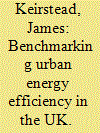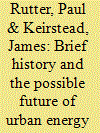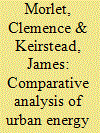|
|
|
Sort Order |
|
|
|
Items / Page
|
|
|
|
|
|
|
| Srl | Item |
| 1 |
ID:
126535


|
|
|
|
|
| Publication |
2013.
|
| Summary/Abstract |
This study asks what is the 'best' way to measure urban energy efficiency. There has been recent interest in identifying efficient cities so that best practices can be shared, a process known as benchmarking. Previous studies have used relatively simple metrics that provide limited insight on the complexity of urban energy efficiency and arguably fail to provide a 'fair' measure of urban performance. Using a data set of 198 urban UK local administrative units, three methods are compared: ratio measures, regression residuals, and data envelopment analysis. The results show that each method has its own strengths and weaknesses regarding the ease of interpretation, ability to identify outliers and provide consistent rankings. Efficient areas are diverse but are notably found in low income areas of large conurbations such as London, whereas industrial areas are consistently ranked as inefficient. The results highlight the shortcomings of the underlying production-based energy accounts. Ideally urban energy efficiency benchmarks would be built on consumption-based accounts, but interim recommendations are made regarding the use of efficiency measures that improve upon current practice and facilitate wider conversations about what it means for a specific city to be energy-efficient within an interconnected economy.
|
|
|
|
|
|
|
|
|
|
|
|
|
|
|
|
| 2 |
ID:
116695


|
|
|
|
|
| Publication |
2012.
|
| Summary/Abstract |
Modern cities depend on energy systems to deliver a range of services such as heating, cooling, lighting, mobility, communications, and so on. This article examines how these urban energy systems came to be, tracing the major transitions from the earliest settlements through to today's fossil-fuelled cities. The underlying theme is "increasing efficiency under constraints" with each transition marked by increasing energy efficiency in service provision, increasing per capita energy use, increasing complexity in the energy system's structure, with innovations driven by a strategic view of the overall system, and accompanied by wider changes in technology and society. In developed countries, the future of urban energy systems is likely to continue many of these trends, with increased efficiency being driven by the constraints of climate change and rising fuel prices. Both supply and demand side technologies are discussed as potential solutions to these issues, with different impacts on the urban environment and its citizens. However in developing countries, rising urban populations and access to basic energy services will drive the next transition.
|
|
|
|
|
|
|
|
|
|
|
|
|
|
|
|
| 3 |
ID:
112906


|
|
|
|
|
| Publication |
2012.
|
| Summary/Abstract |
Local authorities often rely upon urban energy and carbon modelling tools to develop mitigation policies and strategies that will deliver reductions in greenhouse gas emissions. In this paper the UK example of Newcastle-upon-Tyne is used to critique current practice, noting that important features of urban energy systems are often omitted by bottom-up tools including interactions between technologies, spatial disaggregation of demand, and the ability to pursue over-arching policy goals like cost minimization. An alternative optimization-based approach is then described and applied to the Newcastle case, at the scale of both the whole city and the South Heaton district, and using Monte Carlo techniques to address policy uncertainty. The results show that this new method can help policy makers draw more robust policy conclusions, sensitive to spatial variations in energy demand and capturing the interactions between developments in the national energy system and local policy options. Further work should focus on improving our understanding of local building stocks and energy demands so as to better assess the potential of new technologies and policies.
|
|
|
|
|
|
|
|
|
|
|
|
|
|
|
|
| 4 |
ID:
125587


|
|
|
|
|
| Publication |
2013.
|
| Summary/Abstract |
Cities are at the forefront of efforts to combat climate change and in this paper, we examine the influence of urban energy governance on these policy goals. An innovative framework for quantifying the combined governance of cities and energy systems is presented before focusing on a detailed study of London, Paris, Berlin and Copenhagen. By applying an optimization model to assess the lowest cost technology pathways to achieve emission reduction targets, the links between the governance of urban energy systems and the cost of achieving carbon targets are shown. Additionally a novel metric of scenario similarity is introduced in order to evaluate the difficulty of hypothesized energy system transitions. The results indicate that these tools can be valuable in identifying similar cities for the sharing of best practice, for performing comparative evaluations of energy transitions, and for reinforcing the need to complement quantitative assessments with a more holistic appreciation of local context.
|
|
|
|
|
|
|
|
|
|
|
|
|
|
|
|
| 5 |
ID:
098255


|
|
|
|
|
| Publication |
2010.
|
| Summary/Abstract |
This paper considers the field of urban energy policy, a neglected yet important topic. Cities account for approximately two-thirds of global primary energy consumption creating significant benefits and costs. As a result there has been growing interest in the contribution of cities to global energy policy issues such as climate change but a number of significant questions remain: e.g. how do energy policy processes differ between national and urban scales, and how can cities contribute most effectively to global policy goals? We present the results of interviews with key stakeholders in London to illustrate some unique features of the urban energy policy cycle. We then take a wider view, proposing a research agenda with three key goals: describing the global variety of urban energy consumption and policy; understanding the resulting diversity in responsibility, vulnerability and capacity; and developing shared procedures and solutions. Tackling these questions is vital if cities are to contribute fully to current energy policy efforts.
|
|
|
|
|
|
|
|
|
|
|
|
|
|
|
|
| 6 |
ID:
098552


|
|
|
|
|
| Publication |
2010.
|
| Summary/Abstract |
This paper considers the field of urban energy policy, a neglected yet important topic. Cities account for approximately two-thirds of global primary energy consumption creating significant benefits and costs. As a result there has been growing interest in the contribution of cities to global energy policy issues such as climate change but a number of significant questions remain: e.g. how do energy policy processes differ between national and urban scales, and how can cities contribute most effectively to global policy goals? We present the results of interviews with key stakeholders in London to illustrate some unique features of the urban energy policy cycle. We then take a wider view, proposing a research agenda with three key goals: describing the global variety of urban energy consumption and policy; understanding the resulting diversity in responsibility, vulnerability and capacity; and developing shared procedures and solutions. Tackling these questions is vital if cities are to contribute fully to current energy policy efforts.
|
|
|
|
|
|
|
|
|
|
|
|
|
|
|
|
|
|
|
|
|